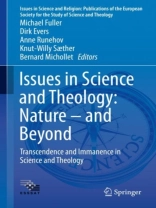This book addresses a variety of important questions on nature, science, and spirituality: Is the natural world all that there is? Or is it possible to move ‘beyond nature’? What might it mean to transcend nature? What reflections of anything ‘beyond nature’ might be found in nature itself?
Gathering papers originally delivered at the 2018 annual conference of the European Society for the Study of Science and Theology (ESSSAT), the book includes contributions of an international group of scientists, philosophers, theologians and historians, all discussing nature and what may lie beyond it.
More than 20 chapters explore questions of science, nature, spirituality and more, including
- Nature – and Beyond? Immanence and Transcendence in Science and Religion
- Awe and wonder in scientific practice: Implications for the relationship between science and religion
- The Cosmos Considered as a Moral Institution
- The transcendent within: how our own biology leads to spirituality
- Preserving the heavens and the earth: Planetary sustainability from a Biblical and educational perspective
Issues in Science and Theology: Nature – and Beyond will benefit a broad audience of students, scholars and faculty in such disciplines as philosophy, history of science, theology, and ethics.
Зміст
Introduction/Preface (Michael Fuller, University of Edinburgh, UK).- Chapter 1. History and Evolution in Pannenberg and Lonergan (Paul Allen, Concordia University, Montreal, Canada).- Chapter 2. Revisioning the Anthropocene in a Trinitarian frame: A theological response to Clive Hamilton’s Defiant Earth (Ian Barns).- Chapter 3. Nature – and Beyond? Immanence and Transcendence in Science and Religion (Philip Clayton, Claremont School of Theology, USA).- Chapter 4. The Ecological Significance of God’s Transcendence? (Ernst M. Conradie, University of the Western Cape, South Africa).- Chapter 5. Awe and wonder in scientific practice: Implications for the relationship between science and religion (Helen De Cruz, Oxford Brookes University, UK).- Chapter 6. Why I am a science-inspired naturalist but not a philosophical naturalist nor a religious naturalist (Willem B. Drees, Tilberg University, The Netherlands).- Chapter 7. A Contingency Interpretation of Information Theory as a Bridge between God’s Immanence and Transcendence (Philippe Gagnon, Université Catholique de Lyon, France).- Chapter 8. Divine Determination or Dynamic Indeterminacy? Transcendence, Immanence, and the Problem of Personal Identity (Janna Gonwa, Yale University, USA).- Chapter 9. Friluftsliv: Aesthetic and psychological experience of wilderness adventure (Mark Graves, Helga Synnevåg Løvoll and Knut-Willy Sæther, Volda University College, Norway).- Chapter 10. The Twin Truths of Divine Immanence and Transcendence: Creation, laws of nature and human freedom (Lydia Jaeger, Institut Biblique de Nogent-sur-Marne, France).- Chapter 11. Early Modern Natural Philosophy Allied with Revealed Religion: Boyle and Whiston (Roomet Jakapi, University of Tartu, Estonia).- Chapter 12. Radical Transcendence and Radical Immanence: Convergence between Eastern Orthodox Perspectives and Strong Theistic Naturalism? (Christopher C. Knight, Institute for Orthodox Christian Studies, Cambridge, UK).- Chapter 13. The Cosmos Considered as a Moral Institution (Alfred Kracher).- Chapter 14. Preserving the heavens and the earth: Planetary sustainability from a Biblical and educational perspective (Andreas Losch, University of Bern, Switzerland).- Chapter 15. The transcendent within: how our own biology leads to spirituality (Sara Lumbreras, Comillas Pontifical University, Spain).- Chapter 16. Beyond the ‘Book of Nature’ to Science as Second Person Narrative: from Methodological Naturalism to Teleological Transcendence (Tom C. B. Mc Leish, University of York, UK).- Chapter 17. Immanence and transcendence: on/off difference or gradation? Implications for science-and-theology (Lluis Oviedo, Pontifical University Antonianum, Rome, Italy).- Chapter 18. A Critical Approach to the Concept of Panentheism in the Dialogue Between Science and Theology: Distinguishing between divine transcendence and immanence in creation (Fabien Revol, Université Catholique de Lyon, France).- Chapter 19. How can energyhelp us think divine immanence and transcendence in the universe? (Bertrand Souchard, Université Catholique de Lyon, France).- Chapter 20. Beyond the disguised friend: immanence, transcendence and glory in a Darwinian world (Christopher Southgate, Exeter University, UK).- Chapter 21. Beyond the Everyday Self (Fraser Watts, University of Lincoln, UK).
Про автора
Michael Fuller has taught science and theology at the University of Edinburgh since 1998. He is the author of a monograph and numerous articles dealing with the interface of science and religion, and he has edited numerous symposia relating to this subject. He is a former Chair of the UK Science and Religion Forum, and Vice-President for Publications of the European Society for the Study of Science and Theology. He is an Anglican Priest, a Canon of St Mary’s Cathedral, Edinburgh, and for 15 years he was Pantonian Professor at the Theological Institute of the Scottish Episcopal Church. His research interests include ethical issues raised by new and emerging sciences.
Dirk Evers is Professor of Dogmatics and Philosophy of Religion at Martin-Luther-University Halle-Wittenberg, Germany. Before joining Halle University in 2010 as a faculty member, he worked as assistant professor at Tübingen University under Eberhard Jüngel. Since his doctoral thesis on cosmology and doctrine of creation in 2000 he has been doing interdisciplinary work at the intersection of science and theology. Since 2014 he has been president of ESSSAT (European Society for the Study of Science and Theology), and he is managing editor of the journal
Philosophy, Theology, and the Sciences.












